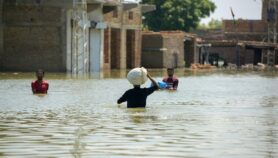By: Mike Shanahan
Send to a friend
The details you provide on this page will not be used to send unsolicited email, and will not be sold to a 3rd party. See privacy policy.
Climate change will cause major water shortages for millions of people in Asia and South America whose supplies come from melting snow and glaciers, say researchers.
They warn that time is running out for these regions to prepare for a severe water-supply crisis.
In a paper in today’s Nature (17 November), the team led by Tim Barnett of the US-based Scripps Institute of Oceanography describes how global warming is disrupting the annual flow of water downstream from snowy mountainous regions.
Rising temperatures mean that not only will there be more rain and less snow in the mountains, say the researchers, but also that snow will melt earlier in the year, resulting in rivers and streams carrying more water, much earlier than normal.
In areas where reservoirs are absent or not big enough to hold the increased amount of water, it will be lost to the oceans, the researchers warn.
But they say areas depending on glaciers to supply dry-season water face even bigger problems.
Communities living below glaciers have long relied on them for ‘fossil water’ that melts slowly from their lower reaches and is replaced by fresh snowfall.
In many parts of the world, however, glaciers are melting at an unprecedented rate. The area of Peru covered by glaciers has shrunk by 25 per cent in the past 30 years.
Glaciers are also melting in Asia’s Himalaya-Hindu Kush region, which includes parts of China and India and contains more ice than anywhere else on Earth apart from the polar regions.
"It’s especially clear that regions in Asia and South America are headed for a water supply crisis because once that fossil water is gone, it’s gone," says Barnett. "This water will not be replaced."
Peter Gleick, president of the US-based Pacific Institute and a member of the US National Academy of Sciences’s Water Science and Technology Board, says Barnett’s paper adds to growing evidence that "one of the most severe consequences of climate change will be effects on water resources, including both supply and demand".
"Developing countries will be especially vulnerable if their water infrastructure is weak or unprepared for such changes," says Gleick. "It is, of course, critical to reduce the rate of climate change, but there are now likely to be unavoidable impacts that must be addressed."
Gleick told SciDev.Net that the "vital next steps" involve assessing how to adapt to these changes, including evaluating the need for new types of infrastructure, and whether it is possible to use water resources more efficiently.
Link to full article in Nature
Reference: Nature 438, 303 (2005)













